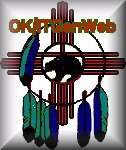  |
Okfuskee County |
  |
|
Home |
Archives |
Cemeteries |
Obits
| Queries
| Additional
Links |
||
  |
Okfuskee County |
  |
|
Home |
Archives |
Cemeteries |
Obits
| Queries
| Additional
Links |
||
Okemah, a community of 3,400 got its name from a Kickapoo Indian, Chief Okemah, who died in a home of his original allotment in 1936. The name Okemah means "great chief" or "great man."
Okemah held its first town site sale of lots on April 22, 1902. On that day, the First State Bank began business in a tent. Its officers included C. J. Benson, president, and W. H. Dill, vice president and cashier. The institution later became known as the First National Bank, on Nov. 10, 1902, and remained in operation under that name until its liquidation in January 1939. The second bank established in the town became known as the Okemah National.
The Okemah town site was selected by Perry Rodkey and H. B. Dexter of Shawnee, who made a survey of a railroad - the Ozark and Cherokee Central Line - from Shawnee to Muskogee by way of Okmulgee. Okemah was built on allotments of Nocus Fixico, Mahala and Peter McNac and Alice Harjo. The allotters were Creek Indians. The original town site consisted of 40 acres of open prairie.
The first trains of the Fort Smith and Western Railroad Co. reached Okemah on May 12, 1903.
The first child born in Okemah was Okemah Dennison, daughter of Mr. and Mrs. Frank Dennison.
Perry Rodkey was the first postmaster in the town.
The Dexter House, Okemah's first hotel, was opened on Sept. 1, 1902 by M. O. Keller, a minister.
Okemah was incorporated in 1904 with J. E. Galloway serving as the first mayor.
There were no titles to property at the community's start since Indian allotters could not legally sell their land. Each allotment included 160 acres.
An Act of Congress in 1903 permitted allotters to sell their lands for
town site purposes.
This page was last updated on 10/12/11
Oklahoma Family Group
Sheets |
OK Gen Web |
County Coordinator Linda Simpson
